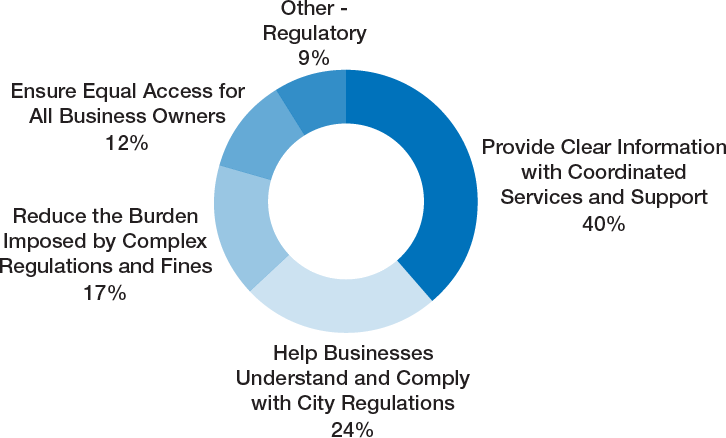
 Small Business First311
Small Business First311 Search all NYC.gov websites
Search all NYC.gov websites
Challenge
The Challenge of Starting, Operating, and Growing in New York City
New York City has a complex regulatory environment, with over 6,000 rules and regulations and around 250 business-related licenses and permits as well as many processes created to ensure compliance with the law. The complexity of this process brings with it many possibilities for confusion and delays from both the business and the City, adding significant costs and hindering business development.
Regulatory requirements weigh heavily on businesses that are small. Unlike some larger businesses, small businesses do not have staff dedicated to managing their interactions with government and may have less knowledge of and experience with City processes and rules. In addition, many small business owners are further inhibited by language, cultural barriers, or other impediments that make this process even more difficult.
The City's small business owners have repeatedly voiced their concerns about the overwhelming maze of requirements and processes that they must navigate to open, operate, and grow. Their concerns are very real and fundamentally important to our City.
In July 2014, Mayor de Blasio launched Small Business First, an initiative led by the Mayor's Office of Operations and the Department of Small Business Services in conjunction with numerous City agencies to dramatically improve the regulatory climate for businesses in New York City. In developing Small Business First, the City worked closely with small business owners, advocates, neighborhood and community leaders, and elected officials. We received more than 600 unique comments and ideas detailing the specific needs of small businesses across the five boroughs.
Public Outreach Results

We heard consistent messages from the meetings, conversations, web submissions, and other dialogue. Small businesses need the City to:
- Provide clear information with coordinated services and support. Business owners need straightforward directions, and easy-to-access services as well as sources for answers to their questions.
- Help Businesses Understand and Comply with City Regulations. City agency staff must work with business owners to provide compliance support and education, rather than focusing on punitive measures.
- Reduce the burden imposed by complex regulations and fines. The City needs to provide a system of laws and rules that is as simple as possible to understand. Business owners must be able to operate within requirements and City agencies must be able to consistently enforce the law.
- Ensure equal access. All entrepreneurs and business owners should have access to City services, no matter where they are located or what language they speak.

